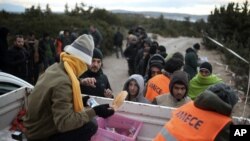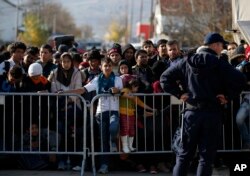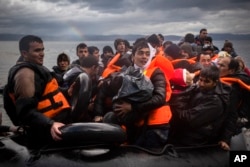Bitter cold, biting winds and rough winter seas have done little to stem a seemingly endless flow of desperate people fleeing war or poverty for what they hope will be a brighter, safer future in Europe. As 2016 dawns, boatloads continue to reach Greek shores and thousands trudge across Balkan fields and country roads heading north.
More than a million people reached Europe in 2015 in the continent's largest refugee influx since the end of World War II - a crisis that has tested European unity and threatened the vision of a borderless continent. Nearly 3,800 people are estimated to have drowned in the Mediterranean last year, making the journey to Greece or Italy in unseaworthy vessels packed far beyond capacity.
The European Union has pledged to bolster patrols on its external borders and quickly deport economic migrants, while Turkey has agreed to crack down on smugglers operating from its coastline. But those on the front lines of the crisis say the coming year promises to be difficult unless there is a dramatic change.
Greece has borne the brunt of the exodus, receiving more than 850,000 migrants and refugees - nearly all of them arriving on Greek islands by sea, usually from the nearby Turkish coast.
"The [migrant] flows continue unabated. And on good days, on days when the weather isn't bad, they increase," Ioannis Mouzalas, Greece's minister responsible for migration issues, told The Associated Press. He said Turkey has been unable "to respond to the duty and obligation it had undertaken to control the flows and the smugglers from its shores."
Europe's response to the migrant crisis has been fractured, with some countries introducing new border controls to limit the flow. The problem is compounded by the reluctance of many migrants' countries of origin, such as Pakistan, to accept forcible returns.
"If measures are not taken to stop the flows from Turkey and if Europe doesn't solve the problems of the returns as a whole, it will be a very difficult year,'' Mouzalas warned.
Along the Balkan migrant route, an undetermined number of men, women and children considered economic migrants have found themselves stranded, their hopes of reaching prosperous northern EU countries dashed by recent border closures. Greece, with thousands of kilometers of coastline, cannot feasibly block people from entering without breaking international laws about rescuing those in distress at sea.
Thousands of migrants are stuck in Greece. Mohammed Abusaid is one of them.
A baby-faced 27-year-old Moroccan electrician, Abusaid left home with dreams of finding work in Germany, or even the United States.
Like tens of thousands before him, he made his way with a group of friends to Turkey and then braved the short but perilous sea crossing to the Greek island of Lesbos in early November.
From there, they headed north toward Macedonia, only to discover the border was open only to refugees from war-wracked Syria, Afghanistan or Iraq. The young Moroccans now spend their nights huddling for warmth in a tent beneath a straggly tree outside Athens' old airport.
"I'm living here like a tramp, but I'm not a tramp," Abusaid said quietly. "I'm single, my parents are old. I want to look for work. We don't cause trouble, we just want to work."
Abusaid finds himself trapped in a country that has been battered by a five-year financial crisis, with unemployment hovering around 25 percent. Desperate, cold and hungry, two of his friends have opted for a voluntary repatriation scheme offered by the International Organization for Migration and are heading home this month.
Abusaid says he might do the same eventually, but for now he subsists on hopes of a better life in northern Europe, or even the U.S. "I wish I could fly like a bird and go there," he says.
Inside the old airport complex, a shelter has been set up at a former field-hockey venue from the last Olympic Games in Greece. Access is limited to vulnerable groups, particularly after theft and looting incidents and fighting broke out.
"We realize it is very difficult for the new government to handle all these elevated numbers," said Chrysanthi Protogerou, director of the Greek Council for Refugees aid organization. ``We were not well prepared and we continue not being well prepared."
She called for "better coordination, to make an even bigger effort, because the problem is becoming huge."
Battered on the one side by a massive wave of desperate people risking their lives to reach its islands and on the other by border restrictions, Greece is struggling.
The minister responsible for migration issues, Mouzalas, said the "countless islands" that are part of Greece make border control an immense task. "If a ground intervention occurs in Syria," he says, "we can't deal with this wave of refugees."
The problem, the beleaguered minister said, "is happening in Greece but it is a European problem and the solution must be a European one."
Nearly all new arrivals are aiming for wealthy northern European countries, with Germany and Sweden the favorites, due to the generous welcome they extended. Germany received about 1 million asylum-seekers during 2015, and Sweden took in more than 150,000.
As the New Year approached, however, even those governments shifted course. Germany introduced border checks in September and Sweden in November. Sweden is now taking steps to keep people from even reaching the border; from Monday, all passengers in Denmark boarding trains bound for Sweden will have to present suitable identification.






